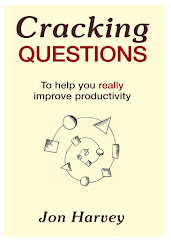Fundamentally, I like questions because they create a space, a pause, a vacuum which pulls in thoughts, reflections and insights. Indeed, all human knowledge, if not endeavour of all kinds, begins with questions
- What is happening here?
- What is causing this?
- Why is this different from that?
- What is the difference that makes the difference?
- What is over there?
- What is on the other side of that?
- Who am I?
- Who are you?
- Why are we here?
One of my favourite psychological models is that of George Kelly who postulated that essentially, human beings are scientists. He argued that we spend our days attempting to understand the physical and social world around us. We ask questions, we invent experiments, we observe results and we interpret our world using patterns, reflections and hypotheses. (In my view, the reason why soap operas are so popular is that it allows us to vicariously test our theories of human behaviour: "James said that to Phoebe last week, I reckon next week... she will do this...")
So we are scientists. And what do scientists do? They ask questions and create methods for answering those questions. Without questions there would be no science, no progress, no light.
All questions are good, but some questions are better than others... I particularly like questions that:
- get underneath what is happening, that open the bonnet as it were
- take people to a different place, where they did not imagine they could go
- can be repeated, gently probing deeper and deeper layers of understanding or self awareness
- challenge people, making them wriggle but not squirm
- open up new vistas, new possibilities, new ideas...
- surprise people and make them smile with a tilted head
- that suggest ideas, but in a way that means the person comes to those ideas in their own fashion
- make people stop, and momentarily dumbfounds them as they struggle for an answer
- build bridges, rapport, common cause and mutual understanding
- help people praise and value themselves, and what they have achieved
- make people laugh, perhaps nervously or confidently or both
Poor questions do the opposite of these. So...
- What kinds of questions do you like?
- What questions work best for you?
- How do you make sure that not only is the content of the question good, but the way it is asked makes it good too?








.jpg)



No comments:
Post a Comment